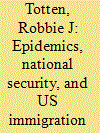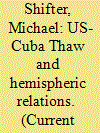| Srl | Item |
| 1 |
ID:
140558


|
|
|
|
|
| Summary/Abstract |
What are relationships between epidemics, national security, and US immigration policy? This question is important because it sheds light on transnational or nontraditional security areas, American immigration policy, and a pressing issue for US leaders who have recently faced epidemics such as the West Africa Ebola outbreak that began in 2013. This article answers it and lays ground in the area by reviewing epidemics in world history, using International Relations and Security Studies works to specify dangers of contagions for states, and identifying three general immigration measures that American leaders have utilized from the seventeenth century to the present day to protect against contagions, which are (1) policies restricting entrance of foreigners thought to carry specified diseases, (2) the isolation or quarantining of immigrants with contagious disease, and (3) delegating the President with authority to stop immigration in the event of an epidemic abroad. This study has implications for research and contemporary US immigration policy.
|
|
|
|
|
|
|
|
|
|
|
|
|
|
|
|
| 2 |
ID:
125152


|
|
|
|
|
| Publication |
2013.
|
| Summary/Abstract |
The focus on undocumented immigrants in contemporary U.S. immigration debates, often at the expense of other immigration issues, has led to an illegality trap. This situation has serious negative consequences for both U.S. immigration policy and immigrants, including an overwhelming emphasis on enforcement; legislative gridlock and the failure of comprehensive immigration reform; constitutional conflict resulting from tensions between national, state, and local approaches to dealing with undocumented immigration; and the puzzling absence of federal policies addressing immigrant integration. This essay argues for a reframing of "illegality" as a contingent rather than categorical status, building on the insights of Plyler v. Doe and notions of implied contract and attachment to U.S. society. Doing so, we contend, will shift the terms of the immigration debate, enabling more fruitful policy discussions about both immigration and immigrant integration.
|
|
|
|
|
|
|
|
|
|
|
|
|
|
|
|
| 3 |
ID:
110955


|
|
|
|
|
| Publication |
2011.
|
| Summary/Abstract |
The provocative question raised by Rogers Smith's "Living in a Promiseland? Mexican Immigration and American Obligations" is whether the tortured history of U.S.-Mexican relations and the racialized context of Mexican immigrant reception can best be ameliorated through targeted immigration policies that would create added opportunities for Mexican migrants relative to others. I argue that the current, more universally-principled system of U.S. immigration policy, supplemented by an inclusive legalization program, can better serve the needs of potential Mexican migrants and Mexican immigrants resident in the United States. Also, I am more skeptical than Smith is about the depths of Mexico's commitment to seeking binational strategies to address the needs of its émigrés abroad.
|
|
|
|
|
|
|
|
|
|
|
|
|
|
|
|
| 4 |
ID:
142858


|
|
|
|
|
| Summary/Abstract |
Washington’s policy of isolating Cuba succeeded only in alienating most of Latin America. Obama’s new course has been welcomed, though other irritants, such as US immigration policy, remain.
|
|
|
|
|
|
|
|
|
|
|
|
|
|
|
|